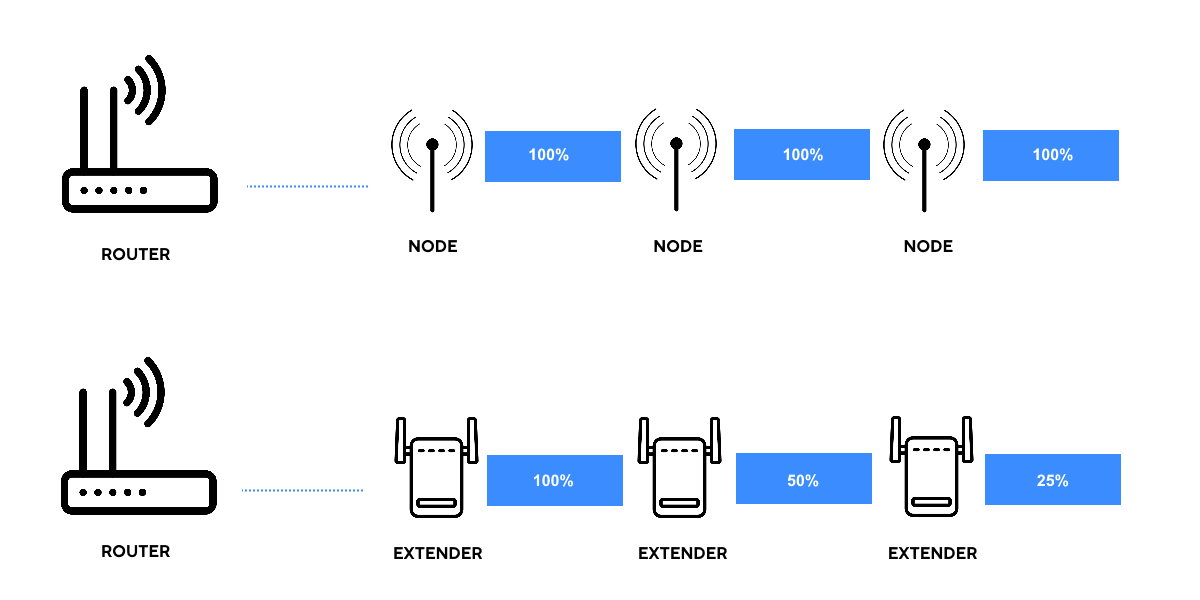Mesh Wi-Fi and regular routers differ from one another—routers act as a central hub whereas mesh Wi-Fi systems offer multiple "nodes" of Wi-Fi around the home, depending on where they are placed.
Often more expensive than your standard router, mesh Wi-Fi networks tend to come with the opinion that they are better or more powerful than routers. While, in some cases, this is true, it really depends on your household setup.
What Is Mesh Wi-Fi?
Wireless routers can only offer wireless signals within a certain range. Living in a larger home, you may notice that your Wi-Fi signal diminishes as you move further away from the router. For example, if your router is placed downstairs, the Wi-Fi signal strength you receive upstairs is weaker.
To solve an issue like this, it's common to invest in Wi-Fi range extenders. As the name suggests, they extend the range of your Wi-Fi slightly further than the router can offer. However, you will not receive the maximum bandwidth your router can offer. That's where mesh Wi-Fi comes in and is one of the reasons it's more expensive than standard routers and Wi-Fi extenders.
In a mesh Wi-Fi system like the TP-Link Deco X20, you'll have the main router hub that connects to your modem to receive the internet (the same as you would a normal router). You can purchase additional nodes or satellites that can be placed around your home to offer full Wi-Fi coverage. These nodes all form part of the same wireless network, so you won't have to connect to them individually.
Therefore, you can eliminate dead spots in your home by simply adding an extra node. Unlike a range extender, your Wi-Fi signal and strength will replicate that of the router.
The Pros and Cons
With many new wireless routers now offering support for Wi-Fi 6, it can be hard to decide whether to invest in a more powerful router or expand your home's network with a mesh Wi-Fi system.
Standard routers tend to be more affordable and are often pretty simple to set up; ideal if you're looking for something that works out of the box. Depending on what you use your home's internet for, a wired Ethernet solution could prove more advantageous, especially for gamers and streamers. You could always use a powerline adapter to extend your wired Ethernet connection options throughout your home, though these come with other limitations.
However, in a busy household, the demand for stable Wi-Fi can be difficult to maintain with a regular router. The last thing you want while you're busy working from home is for your kids to take up all of your network bandwidth to watch shows on Netflix.
On the other hand, Mesh Wi-Fi may take a little longer to set up and involve more cost, but you'll get improved coverage, advanced controls, and a more reliable connection. In that, Mesh Wi-Fi can only operate at the speed you pay your ISP for. It won't make your internet connection suddenly faster, but the increased Wi-Fi coverage throughout your home ensures a strong and stable connection, no matter where you are.
When to Use Mesh Wi-Fi
If you want to future-proof your home's internet, mesh Wi-Fi is a worthy upgrade. Households of three or more people, homes with multiple levels, or buildings with thick walls can definitely benefit by switching out a standard router for mesh Wi-Fi.
However, if you're in a smaller home or your family isn't competing for Wi-Fi, you may find what you already have is sufficient. It really depends on how much coverage your existing router offers and whether you have multiple dead zones or not.


